
Library Etiquette
Do you still remember the majesty of the Public Libraries that we had to frequent in our youth? The days before internet was a quick fix search. Dewey decimal systems and the smells of old and new books. The librarian peeking at you over her reading glasses as you quietly and carefully walked past her massive counter. The feeling of excitement when you held your first library card. The library was an ocean of possibilities, peacefully beckoning you to crack the spine of a hardcover adventure. Hours were spent finding corners to read in, and making sure you returned your books on time to avoid that dreaded R2 fine. If you were lucky, you didn’t have to take notes by hand, but could make copies of those precious pages before using them for your school projects.
As mystical as the library was, it was also a character forming experience. We all knew the rules, almost as sure as muscle memory. From the moment we walked through those heavy doors, we understood that this was a place of resolute respect and consideration, quietly whispering to one another as we discovered other universes hidden in the pages of classic novels.
I have asked our students during the course of this week if they have visited the local library and not surprisingly, most of them have not. We all know that with the hustle and bustle of this day and age, we rarely have the time for simple pleasures, like visiting our local library. If you do ever find that you have a free morning with your child, then I would like to recommend Milnerton Library to you. The facilities are very well kept, and the staff are knowledgeable and kind. This would be a wonderful introduction to the vast community of libraries that our city has to offer. Proper library use is a vital skill, especially when it comes to the later years of education. Why not set our children up for success sooner rather than later. University and high school notoriously consists of ample amounts of research, and knowing how to effectively utilize the available facilities would be extremely beneficial to our children.
In our very own school library, we have discussed library etiquette this week during our lessons. It almost feels like a lost art and is certainly a worthwhile topic.
We discussed a few of the items below:
- What is the function of a library? We established that the library is one of the few places in society that is completely free. You don’t need to spend money to visit and enjoy the facilities. Being afforded the use of the facilities does come with some responsibility though. The resources are loaned to you in good faith, which makes you accountable for how it is treated and returned. Everyone is welcome in a library as it is a public space, cementing in our minds that education should be fully inclusive and knowledge freely available to all. Libraries can be used to study, do research, read, create awareness and so much more. However, the primary function is the loan and return of books.
- Where do we get our books? The students showed a great sense of understanding that the school library mainly grows through your kind donations, this includes the Birthday Book Programme as well as books that you would like to donate when you are no longer using them. We also discussed the purchasing of resources like our readers; and why we should look after the resources in the library. Some classes even delved into publishing, which is a very interesting topic in its own right.
- General Manners: We explored the rules of libraries and especially our school library. Students were reminded that we enter a library quietly; how to look for books and keep the shelves neat; and, where to return the books and how to check out new books for the week. Our conduct in a library is also extremely important: remembering that one must remain kind, caring and encouraging. If we conduct ourselves with consideration to our fellow library users, everyone will enjoy their experience and continue to benefit from the facilities.
- Returns: We discussed books not being returned and why we should always return our books. We should all have access to the knowledge in the library and if we fail to return our loaned books, the next student will not have access to the material. At this stage there are so many books outstanding at our library, that I would like to ask parents to please check if there are any school library books still at home. Your assistance with this will be greatly appreciated.
It has been such a privilege and a pleasure the last few weeks, getting to know the students even better, sharing stories, reading and brainstorming. I simply can’t wait to see what the future holds for our school library.
Trindade Camara
School Librarian

Read More
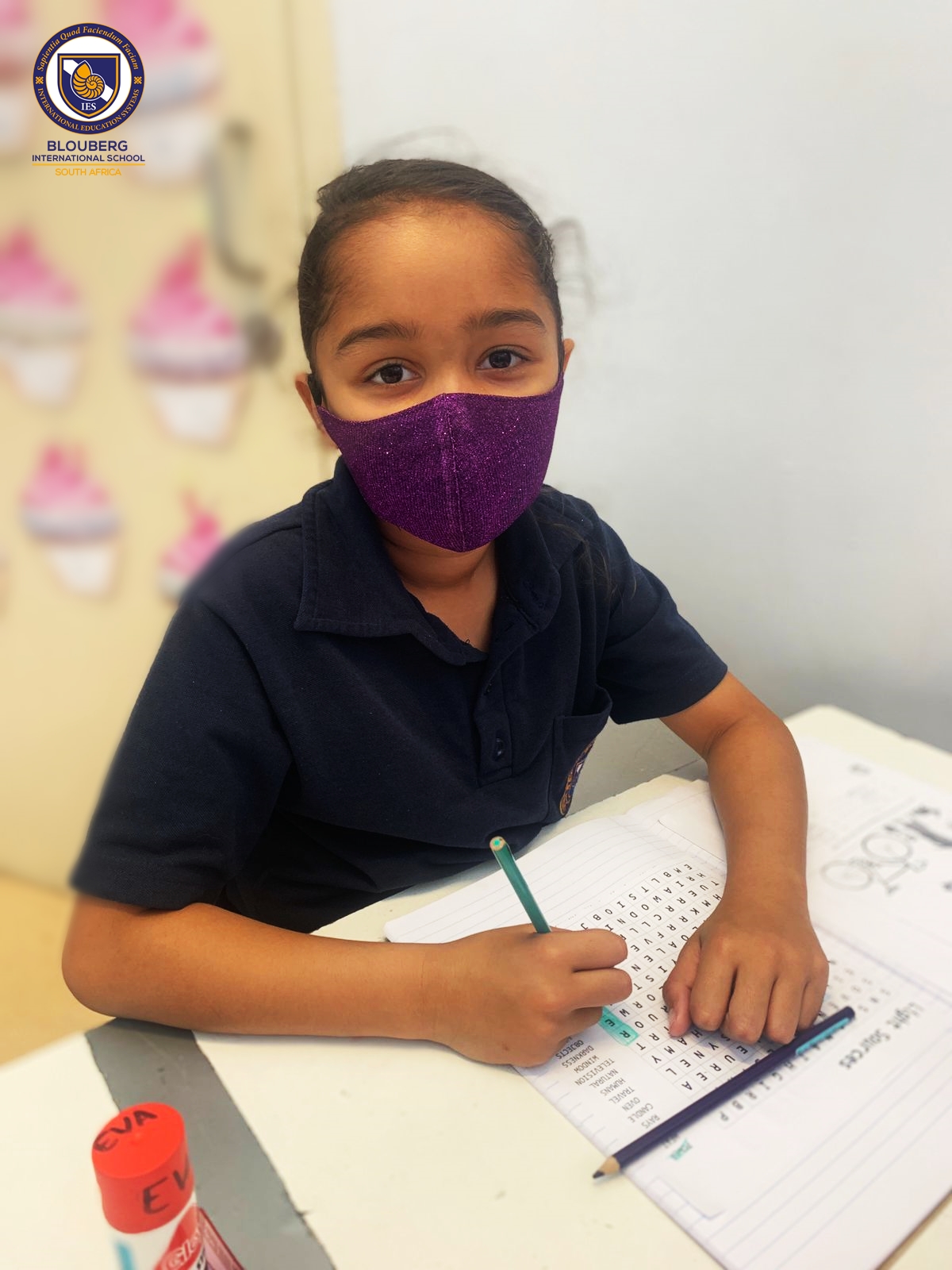
Year 2 Word Search Fun!
Word searches for children are available in a variety of themes and age-appropriate versions, which means that there is a word search out there for every type of child. Each word search features a list of words, some of which a child will be familiar with, and some of which will be new. The more a child encounters new words, the bigger his or her vocabulary will grow.
The following are the benefits of a word search:
- Provide hours of fun
- Improves vocabulary
- Improves spelling skills
- Can enhance productivity
- Provide a way for adults and children to bond
- Offers an appropriate way for children to socialize
- Develops problem-solving and pattern-recognition skills
- Nurtures an attitude of persistence
- Provide effective stress relief and working memory
This week our Year 2’s had some fun doing a word search activity in their Science class. For Science this term we have been looking at Light and Dark Sources. We find that this kind of activity is a fun way to learn and also revise what we have learnt as well.
Siobhan Hendry
Year 2 Teacher
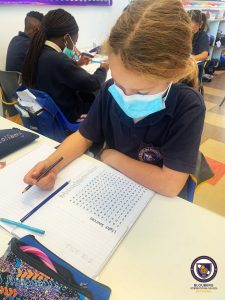
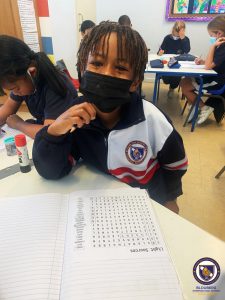
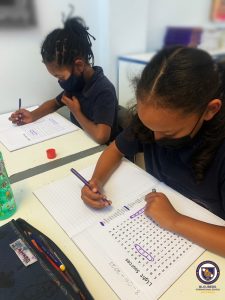
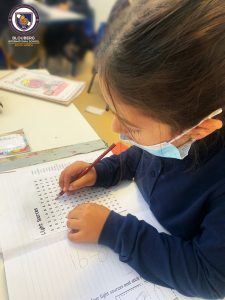
Read More

Fun Day
As the end of term has arrived, it was with great excitement that the little ones came to school dressed in Civvies ready for their Fun day.
The teachers planned various activities, mostly making a big mess, because making a mess is always the most fun. The little ones painted the most beautiful pictures, dancing, playing outside and generally having lots of adventures.
We would like to thank our parents for everything they do to support their children’s learning journey. We cannot do this without them.
Wishing everyone a fantastic holiday!
Monique Meyer
Foundation Stage Coordinator




Read More

High Frequency Words
Last week we had a High Frequency Word Hunt. The students had to go and find flashcards of words on the playground according to a list in pairs. They thoroughly enjoyed this activity and excitedly showed the teachers all the words they could find from their lists.
Learning to read is a complex process, which involves many skills. Two of these skills is phonological knowledge and the other is memorising High Frequency Words. Phonological knowledge helps students to decode or sound out words. That is why it is more important to know the phonetic sound of letters rather than the alphabet name, so that words can be spelt out phonetically, like the word c-a-t. Knowledge of High Frequency words is important for those words that cannot be sounded out phonetically, such as the word ‘you’ or ‘the’. These words commonly occur in sentences, hence the term High Frequency Words. That is also why students have greater confidence and fluency when they have been spending time memorising High Frequency Words as part of their reading homework at home.
It’s important that parents try to make learning High Frequency Words fun. Here are some helpful ideas in the links below:
https://www.curiousworld.com/blog/sight-word-games
https://www.weareteachers.com/sight-word-activities/
https://www.themeasuredmom.com/25-low-prep-sight-word-activities/
Bronwen Nuthall
Reception Year Teacher


Read More

Year 2’s Rock Online Learning!
We sometimes tend to underestimate our children’s ability to adapt to change and forget how resilient they are. The dreaded ‘online learning’ loomed over our heads during the holidays. Would we? Wouldn’t we?
Of course, I can only speak for us teachers and have no idea how much effort, bribing or even begging, parents have had to resort to, to ensure their children are online and also complete their work daily. So, our heartfelt thanks go to all the parents, grandparents, family members and friends who are supporting the children during this process.
I have really enjoyed the one-on-one chats I have had with my class over the last few days. In a classroom situation, often there just is not enough time to listen to every child’s story or viewpoint.
Yes, it is stressful for parents and teachers alike, but if I compare Term 3 now, to the hard lockdown during Term 2 last year, I think we have all come a long way.
We look forward to welcoming our students back into the classroom and sincerely hope it will be sooner than later.
Kim Coetzer
Year 2 Teacher


Holiday News
The winter holidays are often a challenge for many parents especially when there are rainy days. However, the Year 1 students enjoyed the time at home and had lots of fun.
Usually on the first day back at school, they love to share their news with their peers, but could not do that with online learning. Instead, they have practiced their writing skills and wrote about the highlights of their holiday.
Ann Cordner
Year 1 Teacher
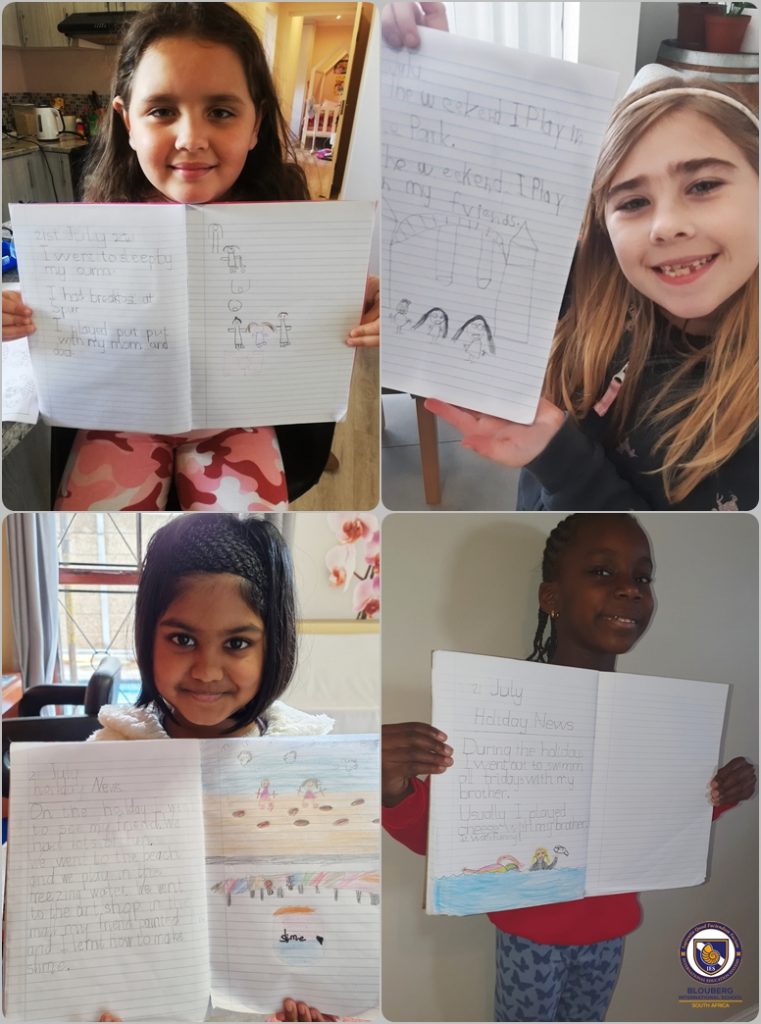

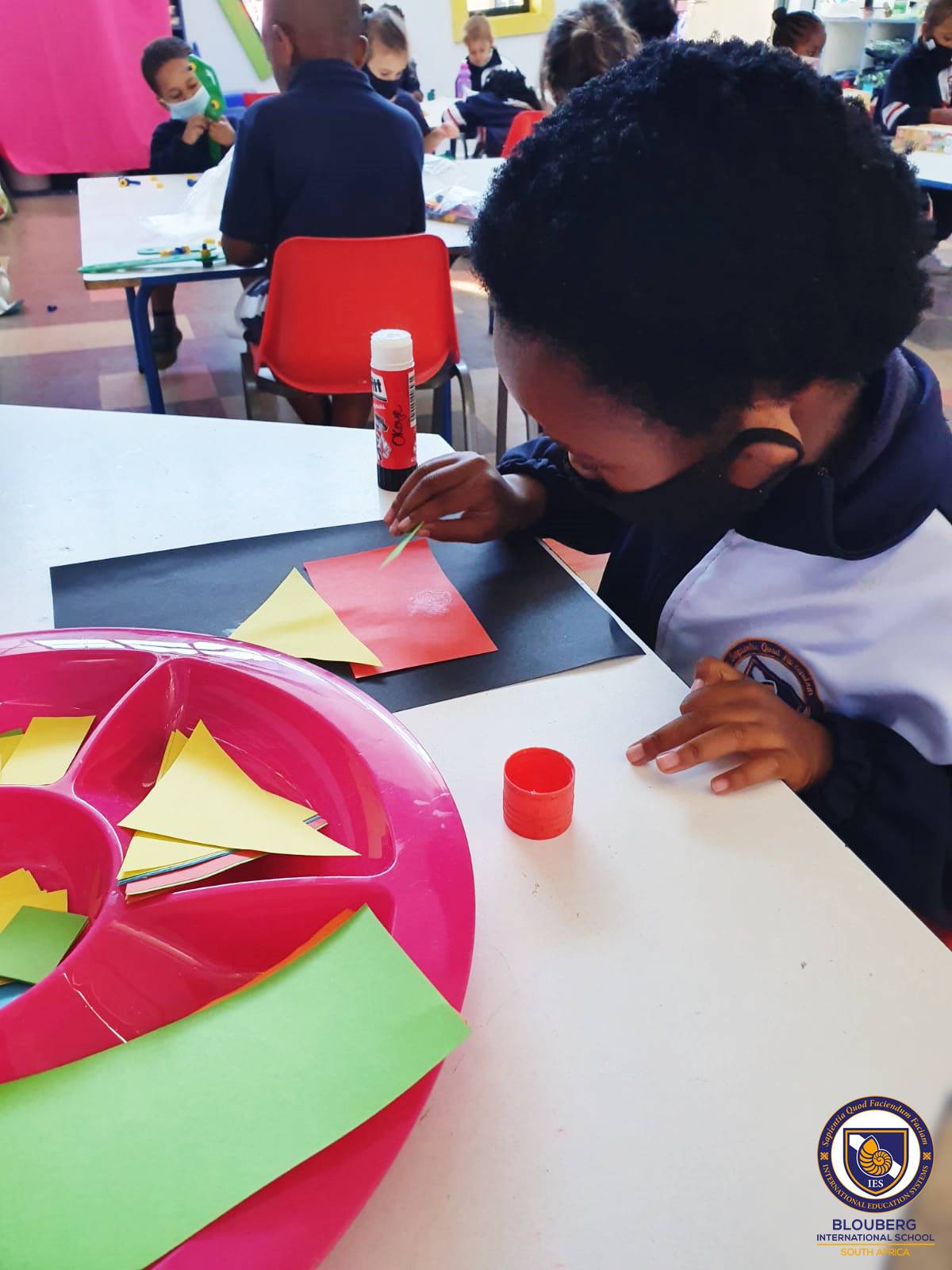
Revision For Success!
During the last few days of school, we spent a lot of time consolidating some of the work covered over the first two terms. The students used letter and number cards, playdough, whiteboards and markers and educational games to demonstrate their knowledge and developing skills. Some of the educational games we played were pattern match, colour recognition, shapes recognition and we have even learned how to write our own names!In Literacy, we learnt about all the Jolly Phonics and the sounds they make. Linking sounds to letters, naming and sounding the letters of the alphabet. A student cannot learn to read without proper knowledge of phonics. It is the foundation for success in reading. The students make a connection between the words we put together and what they look like in print. Phonics skills are necessary to jump-start the process of learning to read, but reading by sight is more efficient.
In Numeracy, we learnt about colours and shapes (2D) within our environment. We learnt about patterns, recognizing and recreating various patterns using a repeated sequence. We learnt about numbers, counting and using developing mathematical ideas and methods to solve practical problems. We even learnt about addition and subtraction and the correct vocabulary associated with them through number rhymes. Students have attempted to write for a variety of purposes, using features of different forms.
Martie van Dyk
Pre-Reception teacher
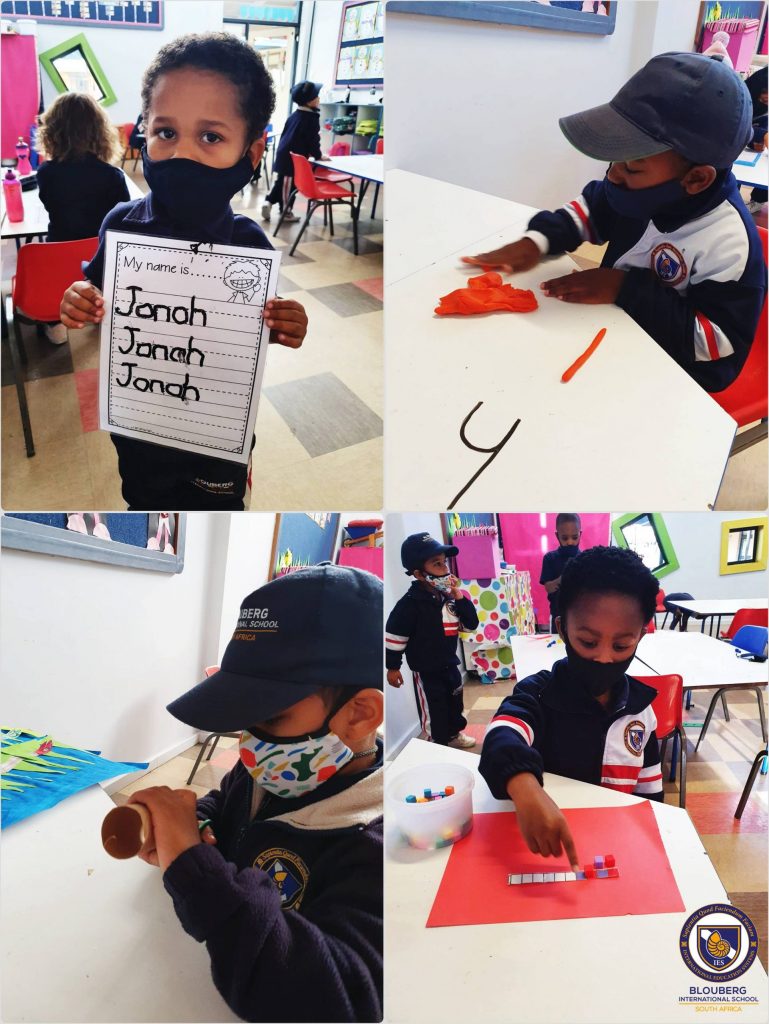
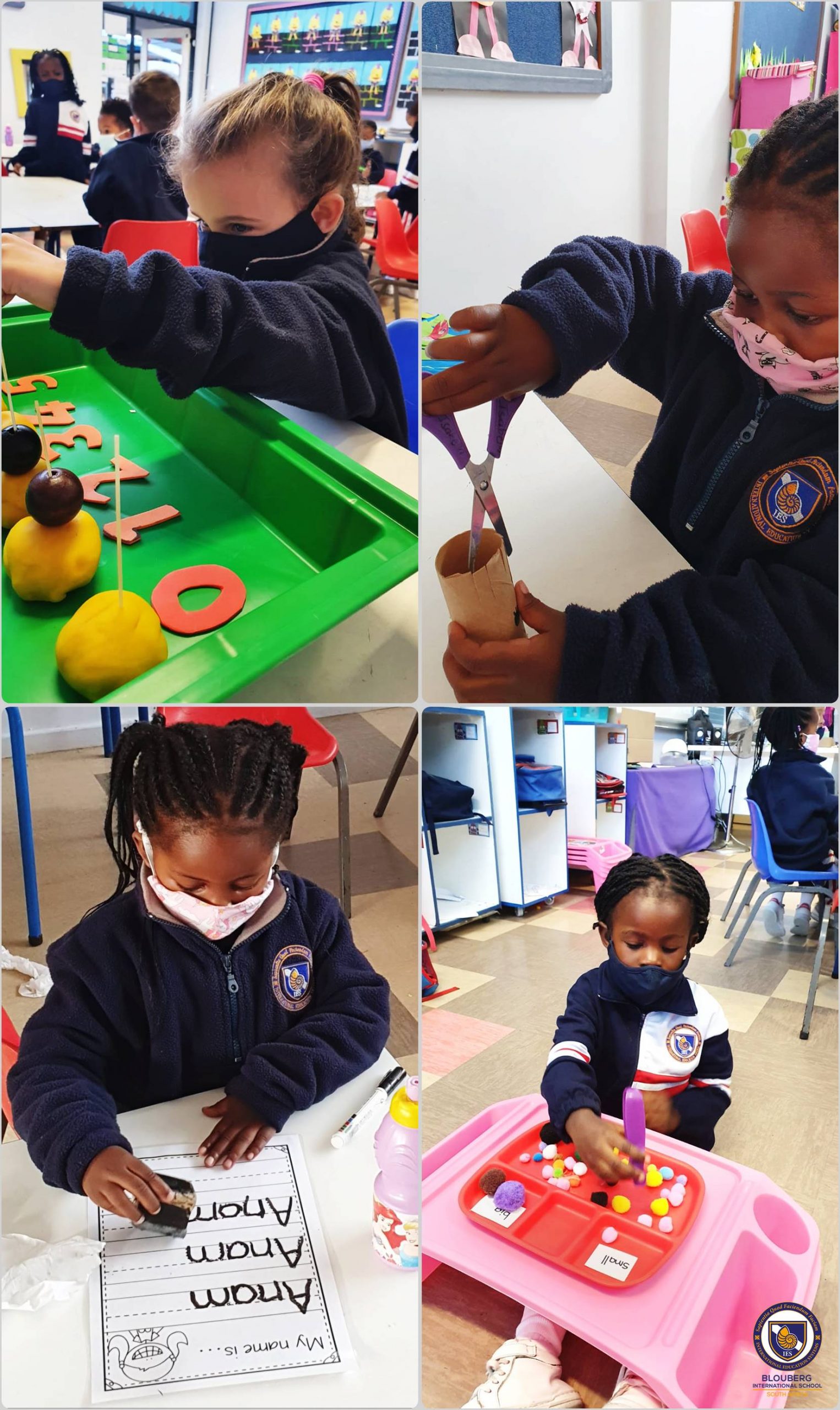

Emergent Literacy In Reception Year
Our Reception students have been enjoying revising the letter sounds they have learnt by paging through magazines to look for the letter sounds. Once found they need to cut them out and paste the sound to match the sound on a colourful page.
This task is part of emergent literacy and combines quite a number of important skills such as fine motor skills, hand eye co-ordination, visual memory and letter recognition skills. As they page through the magazines students are exposed to letters in other fonts and also need to make the link between upper and lowercase letters.
Here are some fun ways to develop letter recognition at home:
- Writing letters on bathroom tiles using bath crayons.
- Writing with a whiteboard marker on a sliding door or mirror.
- Looking for known letters (and perhaps words) on number plates and signs in the community.
- Playing I spy to identify objects at home that begin with a specific letter (remember to use the phonetic sound (example: mmm, not ‘em’).
- Finding letters on a shopping catalogue.
- Writing letters in something fun on a tray, such as custard, chocolate pudding or dry substances such as icing sugar, jelly powder, rice or salt.
- Writing letters using a pointer finger on a steamed up mirror.
- Making letters out of playdough.
- Making letters out of salt dough and cooking it.
- Making letters with sweets on iced cupcakes.
- Finding letters in letter pasta.
- Writing simple words using Jelly Tot letters.
For more great ideas have a look at our Foundation Stage Pinterest Page: https://pin.it/1Of5Yuy
Bronwen Nuthall
Reception Year Teacher



From The English Department Term 2 2021
Greetings from the English Department!
It’s only the second week of term and already my desk is hidden under a snowfall of loose paper. And we all know what ‘Term 2’ means… the whispers of which flit their way along the corridors in tones of quickened dread… it’s an exam term.
“Honestly, it’s really not that bad!” My biannual refrain seems to bounce off the students like those tiny silver balls used to decorate cakes (not the most creative analogy, I admit, but what else would bounce dramatically pleasingly off a teenager?). Point is, they never do seem to believe me. Rather than inspire dread, I believe an exam term is an exciting challenge! An opportunity to beat your personal best and push the pliable boundaries of our own abilities. However, we’ve still got a few weeks ahead of us and plenty of essays to pen before exams start. So, pop your head down the rabbit hole and take a look at what our students are busy with in English class:
The Year 7’s can only watch as the blisters spread across the palms of poor Stanley Yelnats as he digs those blasted holes at Camp Green Lake. A class project making homemade Sploosh anyone? Although perhaps the season for peaches is over?
Ralph, Jack and Piggy are the constant companions of the Year 8’s this term… and ‘the beast’ of course! We can’t forget about him…or it?
The Year 9’s are wading through their IGCSE Literature short stories and this week covered a particularly satisfying story called ‘The Widow’s Might’ by Charlotte Perkins Gilman. A widow gets the upper hand on her children who, after their father’s death, are quibbling over ‘who gets mom’ and eagerly awaiting the arrival of the lawyer with dad’s will. The students experimented with Blackout Poetry as way to engage with the deeper concerns or themes of the short story. We received some beautiful and insightful submissions; the talent of our students never ceases to warm my heart. Please see the photos accompanying this article.
The Year 11’s are similarly enmired in the wonderfully marshy ground of prescribed short stories (the ‘short’ in short stories being a decidedly subjective term). They have just read a story called ‘Gabriel Ernest’ (Hector Hugh Munro) about a werewolf who, well, does what werewolves do best really.
Our 10’s and 12’s are on a desperate quest for something so rarely experienced in the final year of IGCSE and AS-level – free time. The word ‘revise’ a mantle around their shoulders. Setworks are looking decidedly grubby and overly thumbed, but the sight of their dog-eared books I find oddly reassuring… experience has taught that it’s the pristine-looking copies one needs to be concerned about.
And for now, that’s all from us. If you are looking for the English Department, we are reassuringly close to the library, always within reach of a good book.
Alice Pryor
High School English Department

Some of our students created these amazing poems using the Blackout Poetry technique. [1] Blackout Poetry is a form of “found poetry” where you select specific words from a page of a printed text and then redact all the words you don’t want.
Read More

We Know How To Use A Dictionary!
The Year 3 group have been learning how to use a dictionary. They are having so much fun building their vocabulary which is one of the greatest assets that a student can have. It improves their academic performance and lays a strong foundation for future skills to develop. The use of a dictionary has also been linked to better mental health.
Using a dictionary supports students in developing language skills and helps them understand new words at different ages. Using a dictionary helps students master important concepts like spelling, word meaning, alphabetical order and word classes.
Using a dictionary is a skill for life that students develop with practice. We are so proud of the Year 3’s who have developed a love for dictionary work, which makes looking up words fun!
We are pleased with their application considering that they are using dictionaries for the first time. Well done Year 3!
Sasha Rajah
Year 3 Teacher






